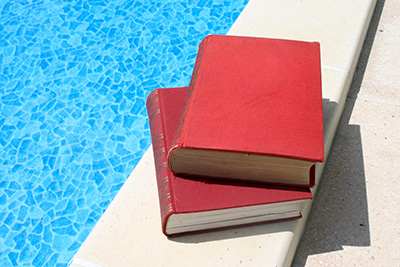 I have always loved reading, it seemed natural then to study literature in university. Some of these works were difficult and, with time constraints, seemed nearly impossible to get through. For me, this was Vanity Fair by W.M. Thackeray. It’s long and complex, and, in my strain to get through it, I missed a few key aspects of the novel. Perhaps if I had picked up on these it would have been easier to digest. Reading for university is far different than reading for pleasure. Throughout the program I tried to inject some pleasure reading along the way. Granted some(most) of the books assigned were a pleasure to read, but reading them was not as relaxing?there were things within the book, within each chapter or each scene, that were vital to understand for the course.
I have always loved reading, it seemed natural then to study literature in university. Some of these works were difficult and, with time constraints, seemed nearly impossible to get through. For me, this was Vanity Fair by W.M. Thackeray. It’s long and complex, and, in my strain to get through it, I missed a few key aspects of the novel. Perhaps if I had picked up on these it would have been easier to digest. Reading for university is far different than reading for pleasure. Throughout the program I tried to inject some pleasure reading along the way. Granted some(most) of the books assigned were a pleasure to read, but reading them was not as relaxing?there were things within the book, within each chapter or each scene, that were vital to understand for the course.
Reading in this way can be enjoyable, though not entirely relaxing. You must always be vividly aware of what is happening and why it is happening, and commit these to memory. Because somewhere in the thousand-page work is a quote which will be needed. A scene which will be tested, or a character which must be remembered. Reading these assigned works gave me new favourites (Tess of the d?Urbervilles by Thomas Hardy), new genres, time periods, and a more rounded reading experience. Through the works of the nineteenth century to the post-colonial and children’s literature I gathered an understanding for the importance of the written word. I gained an appreciation for the power of a well written novel and the changes it could inspire. It is somehow easier to face a dark reality when it is presented in the form of fiction. Fiction has the ability to rip out your heart and show you It’s darkest sides without forcing you to be defensive. You can merely observe what is being shown to you and allow it to affect the way you see the world: a work of fiction has the ability to change the way you see the world and yourself in relation to it.
Taking literature courses throughout my program changed the way I see the world, the way I write about the world, and the goals I have for that writing. I have come to understand the importance of a story, a well placed word, and in re-reading works. There is no reading experience quite like reading for a paper, exam, or discussion. I read many great works throughout university but one that did not make the roster sat on my ?to be read? pile for a long time. Having picked my way through other books at an alarming rate, I finally decided to tackle the mountain that is Leo Tolstoy’s Anna Karenina. I have found myself grateful for the chance to read it, and perhaps more grateful that I am not writing a paper on it. There are many nuances within the work and statements on society that would be excellent fodder for any paper, but finding the quotes or picking a single topic would prove challenging. To peel away the rest of the novel and focus only on a single topic would prove to be nearly impossible.
Reading Anna Karenina in this way I have found myself enjoying the process, seeing the ideas that would translate into papers, but allow myself to only touch the surface of some. This book is truly one worth re-reading as I think that every time you pick the book up a new story will emerge. I enjoy that I can read this one until my eyes grow weary and set it down. I do not have a deadline to finish it, nor the need to remember every detail; I even have the ability to skip scenes without much consequence should I desire.
Reading for pleasure and reading for study are different processes, yet one benefits the other. Reading for study trains us how to see between the lines to pick out the important aspects of a novel and analyze them until there seems to be nothing left; reading for pleasure you can see these things but are granted the ability to only touch their surface, not to delve into their depths unless you so desire. Neither style of reading is better than the other per-se, but one, I find, is entirely more relaxing.
Deanna Roney is an AU student who loves adventure in life and literature


